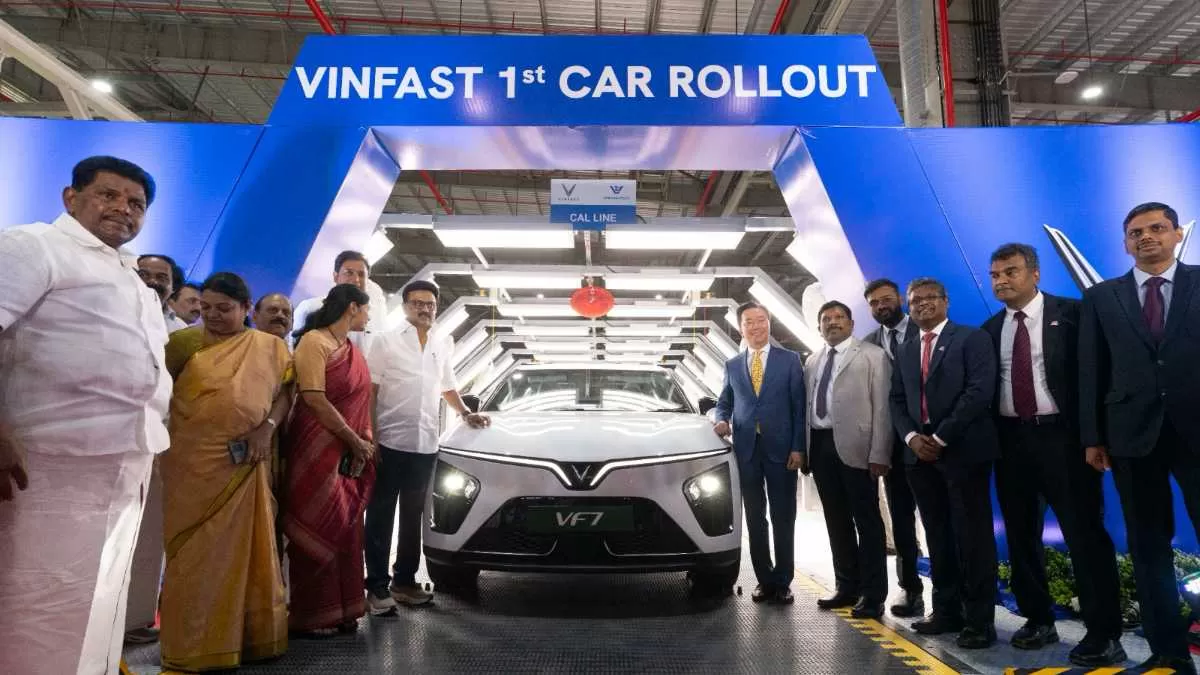Vietnamese electric vehicle manufacturer VinFast has commenced production at its new Rs 41.7 billion (USD 500 million) facility in Thoothukudi, Tamil Nadu. The factory is part of a larger Rs 167 billion (USD 2 billion) investment plan in India and marks a key milestone in the company’s broader expansion across Asia.
The plant will initially produce 50,000 electric vehicles annually, with the capacity to scale up to 150,000 units. Located near a major port in one of India’s most industrialised states, the factory is expected to become a key export base for South Asia, the Middle East, and Africa. VinFast says the facility will generate over 3,000 local jobs.
The Vietnamese carmaker selected Tamil Nadu after evaluating 15 sites across six Indian states. The state’s strong automotive ecosystem, skilled workforce, and reliable infrastructure made it the preferred choice, according to Tamil Nadu Industries Minister T.R.B. Raaja. “This investment will help create a new industrial cluster in south Tamil Nadu, which is vital for India’s growth as a global manufacturing hub,” he said.
Pham Sanh Chau, VinFast Asia CEO, said the company plans to expand into other sectors like green energy, smart cities, and tourism, based on an invitation from Chief Minister M.K. Stalin, who assured full support to build an entire ecosystem in the state.
Strategic Shift to Asia
The move into India is part of VinFast’s pivot to Asia following challenges in the US and European markets. The company also began work last year on a Rs 16.7 billion (USD 200 million) EV assembly plant in Indonesia and is expanding in Thailand and the Philippines.
VinFast sold nearly 97,000 vehicles in 2024, tripling the previous year’s figure. However, only around 10 per cent of sales were outside Vietnam. The new Indian plant is central to its goal of increasing exports to countries like Nepal, Sri Lanka, and others in the region.
India, the world’s third-largest car market, presents a compelling opportunity with its growing economy, supportive EV policies, and a relatively open market for new entrants. “It’s a market no global automaker can afford to ignore,” said Ishan Raghav, Managing Editor of autoX magazine.
India’s EV Landscape
India’s EV growth has so far been led by two- and three-wheelers, which made up 86 per cent of the over six million EVs sold last year. Passenger four-wheeler EVs still account for a small share — only 2.5 per cent of total car sales — but that number is rising fast, from just 1,841 units in 2019 to over 110,000 in 2024.
The government aims for EVs to comprise one-third of all passenger car sales by 2030. Energy analyst Charith Konda from IEEFA said improved batteries, faster charging, and more stylish models have sparked demand. “The EV story in India only truly began three to four years ago,” he noted.
VinFast is targeting this growing segment with its VF6 and VF7 SUV models, designed specifically for the Indian market. The VF7 will be the company’s first Indian launch and is intended to offer premium features at a competitive price point, unlike the models marketed in the US, Canada, or the EU.
Advantage Over Chinese Rivals
While Chinese EV makers like BYD and SAIC have struggled in India due to geopolitical tensions, VinFast benefits from a neutral positioning. India has blocked Chinese companies from establishing manufacturing bases since 2020 and levies heavy import duties on foreign-built vehicles to promote domestic production.
VinFast plans to make battery packs and powertrains locally, recycle batteries, and collaborate with Indian firms for charging and servicing infrastructure. It has signed agreements to open 32 dealerships across 27 cities, with a long-term plan to scale.
Tesla, which recently launched the Model Y in India at nearly Rs 6.7 million (USD 80,000), faces similar hurdles with India’s import-heavy policies. “India’s stance is clear — we do not want imported EVs,” said Konda.
A Challenging Path Ahead
India’s EV market is highly competitive. Tata Motors and Mahindra dominate the affordable segment, while Hyundai, MG, and luxury brands lead at the premium end. EVs are still largely seen as secondary, urban vehicles due to limited intercity charging infrastructure.
VinFast must build trust with India’s value-conscious buyers and offer reliable service and battery quality, said Vivek Gulia of JMK Research. “Initially, people will be cautious, but if VinFast gets the pricing and product right, they can perform very well,” he said.
After collecting feedback in a customer clinic in 2024, VinFast updated its product features to meet Indian preferences. The company sees EVs as a transformative tool for urban mobility and aims to make its vehicles both aspirational and affordable for India.




















